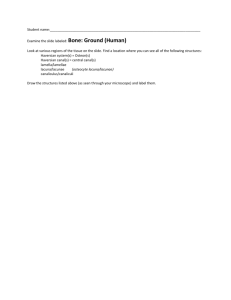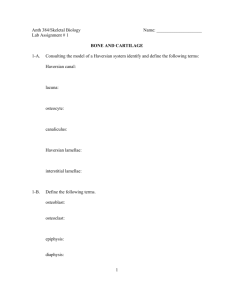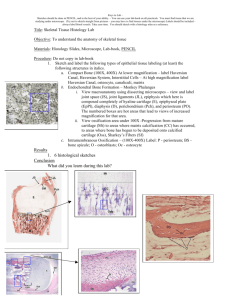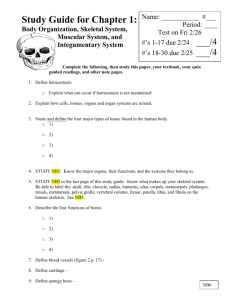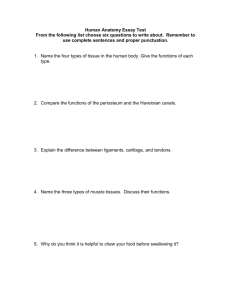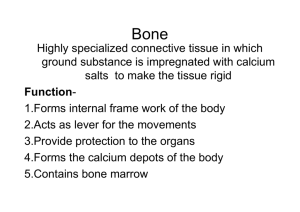Document
advertisement
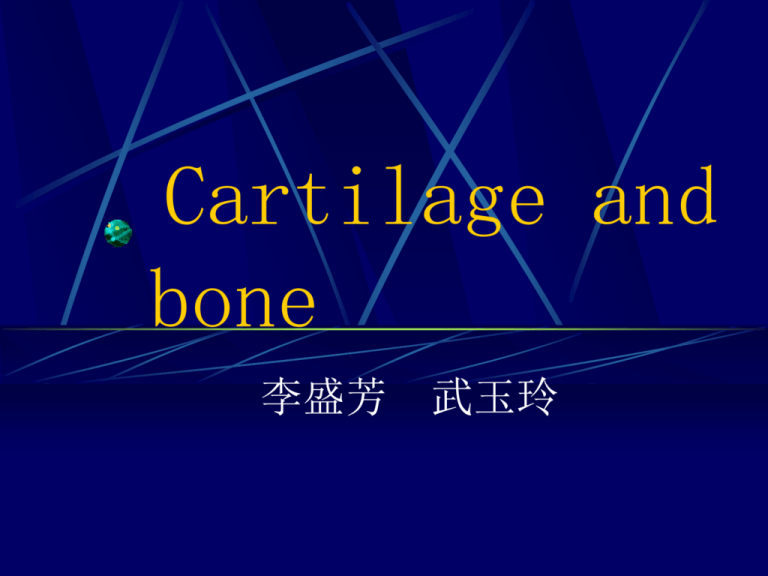
Cartilage and bone 李盛芳 武玉玲 34 Cartilage: cross section of cat trachea It is hollow organ.In the wall ,the dark blue color shows the hyaline cartilage. Low magnification : Inner surface : lining the pseudostratified ciliated columnar epithelium . 1.hyaline cartilage : the dotted structures show the chondrocytes.Among the chondrocytes , homogeneous area is extracellular matrix composed of collagen fibrils and ground substance with the same refractive properties. 2.perichondrium 2 1 1 High magnification: 1.perichondrium composed of dense fibrous tissure containing chondroblasts. 2.chondrocyte: located in a space called lacuna. 3.cartilage capsule: densly basophilic zone surrounding the lacuna. 4.extracellular matrix:amouphous homogeneous area 5.isogenous group a group of 2 3 5 4 Section of living long bone shaft: low power specific stain . 1. Outer circumferetial lamellae:parallel lamellae along the outer surface of the long bone. 2.Haversian system: made up of a central canal ,Haversian canal and Haversian lamellae. 3 .interstitial lamellae: remnants of old Haversian system,located between the Haversian system,without central canal. 4.osteocyte:the dotted structures show the osteocytes,densely staining. 1 2 3 4 Section of compact bone: 1.osteon :or called Haversian system,in the haversian canal ,the blood vessels ,lymphatic vessels and the delicate CT can be seen. 2.central canal: in the centre of the Haversian system dark appearance because the air is trapped in the section. 1 2 3 3. Volkman canal or called perforating canal ,which is a long tubule ,linking the two Haversian canals. 4.inner circumferential lamellae: in the bony marrow cavity: the blood vessels and adipose tissue have been seen. 4 High magnification Of compact bone: focus a large Haversian system. 1.osteocyte: the cell body of osteocyte is located in lacuna. 2.the cell processes of the osteocyte located in the fine tunnels , called canaliculi. 3.Haversian canal--central canal in which is full of dye or air. 1 3 2 Cross section of decalcified compact bone: H&E stain Manufacturing process: Cut piece of long bone diaphysis ,fixed and decalcified in acid solution,sectioned and stained. The red colour shows the compact bone ,centre is bone marrow cavity. Low magnification: the Haversian systems with various sizes can be seen. 1.central canal: Contains the blood vessels , lymphatic vessels and delicate CT. 2.osteocytes: located in lacunae .The cell bodies shrink or desquamated while histological preparation . 1 2 Ground section of compact bone: Manufacturing process: cut piece of old long bone and grind with grinding stone until it becomes as thin as possible then stained. Low magnification 1.Haversian system composed of Haversian lamellae and central canal in which fill with dye or soil,dark staining. 2.Volkman canal: A long tubule linked between the two central canals. 3.osteon : Haversian system 3 1 2 High magnification: 1.osteon: composed of Haversian canal and Haversian lamellae. 2.central canal 3.Volkman canal or called perforating canal full of dye. 4.lacunae: flat,almond shaped structure ,from which the radially arranged fine rays are canaliculi. 4 3 2 1 10 Histogenesis of the long bone:H&E stain Longitudinal section of knee joint of fetus (3.5month),the black arrow shows the epiphysis ,light gray in color ;the red zone shows the diaphysis.。 Low magnification: From the epiphysis to diaphysis ,4 zones of ossification can be found. 1. Reserve zone: resting zone: a typical hyaline cartilage,the smaller chondrocytes are dispersed evenly. 1 2. Proliferating zone: the chondrocytes divide rapidly and forming many clusters ,they run along the long axis of the long bone . 3 .the calcified cartilage zone: The chodrocytes enlarge with foamy shaped cytoplasm and pyknotic nucleus. 2 3 1 Proliferating zone 2 hypertrophic cartilage zone 3.Calcified cartilage zone:Chondrocytes enlarge greatly with vacuolated cytoplasm and pyknotic nuclei. 4.ossification zone: the chondrocytes degenerate and the lacunae of calcified matrix were destroyed forming tunnels called primary bone marrow cavity filled with hematopoietic tissue. 1 2 3 4 1 2 1.zone of calcification 2.zone ossification found trabeculae and hematopoietic tissue. Osteogenic zone: 1.bone marrow cavity 2.developing trabecula = woven bone 3.osteoblasts attach to the surface of trabeculae. 4.osteocyte 1 3 2 4 1.periosteum 2.bone collar : spongy bone 3 .bone marrow cavity :hematopoietic tissue. 2 3 4.developing trabecula: The trabecula with central calcified cartilage matrix gray in color. 4 1 High manification: Observe the osteoblasts and osteoclasts in the osteogenic zone. 1.osteoblast: The osteoblasts are cuboidal or low columnar in shape attaching to the periphery of trabeculae arranging side by side. with basophilic cytoplasm. 2.osteocyte: situated in the lamellar bone of the trabeculae. 2 1 High magnification of the osteogenic zone: Focusing the osteoclasts: 1.osteoclasts: multinucleate 1 Large cells contain many nuclei always located in the depression zone of trabeculae. 2.developing trabeculae contain calcified cartilage matrix. 3.bone marrow cavity: Contain hemapoietic tissue. 2 3
